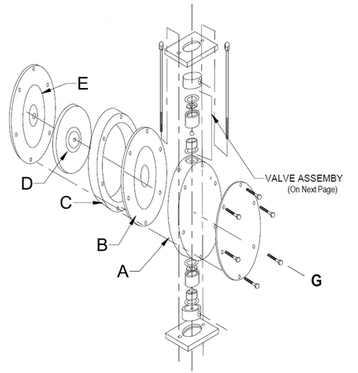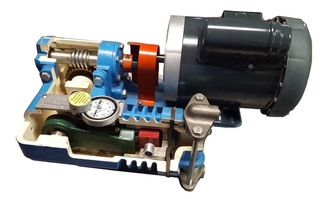Madden Pump makes high quality, industrial chemical injection pumps. Each pump is made to order and then put on a bench test. For every single order.
Our smaller, family owned manufacturing company does not normally compete on high quantity orders. As a result we do not pre-build and stock our chemical dosing pumps. Instead, each one is designed, built, and tested per individual inquiry sent to us. Even if it is a reorder, the chemical pumps are individually built and tested when the order comes in.
The employees that make up Madden Pump emphasize quality products and responsive service above anything else. We want our reputation to be based on these two features, and bench testing every chemical metering pump we make, even if it is our minimum 1 hour test on an emergency pump, goes a long way in ensuring we follow through with this.
Why it’s important, not just the obvious answer
The obvious answer is to make sure the pump works. However, when you dive further into the nuances of building a chemical injection pump, you will see just why we make sure to bench test every time.
 |
| Exploded view of a Madden Type DDB double diaphragm assembly to show how intricate pumps can get when designed for accuracy and consistency. |
With chemical injection applications, accurate and consistent output are the most crucial factors. This is why industry experts recommend a positive displacement pump, usually a diaphragm metering pump, or piston driven pump for dosing chemicals. This type of pump traps the same specific amount of liquid and then forces it out a valve assembly, with each stroke.
To achieve accuracy and consistency with a +/- 1% tolerance, every part going into the pump must be made with precision, to the measurements required for that particular design. For example, Madden chemical pumps’ have an internal rod, which varies in stroke length between models to achieve different outputs, but, they are 100ths of an inch different in their set lengths. Those 100ths of an inch can be all it takes to produce several gallons more or less an hour then what the metering pump design is intended to produce.
Sticking with that line of thought, imagine how many other things can affect a chemical metering pump’s output. For example, simply turning the diaphragm a little tighter, or looser would make up the difference of a 100th of an inch.
This is where bench testing comes in.
Bench testing is more than a check list, it involves fine tuning
The aforementioned points are not meant to concern any readers currently looking into chemical metering pumps for their chemical injection application. The points are merely made to drive home the idea that a chemical pump needs to be thoroughly tested before shipping out, and that this should be a very important factor in your purchasing decision.
Bench tested pumps are fine tuned to achieve optimal performance.
At Madden Pump, each chemical metering pump must pass the bench test before being shipped. However, our bench test is NOT merely a checklist for:
- Is it pumping
- Does it pump against pressure
- Is it running quietly
- Is it overheating
- Does the adjustment knob work
- Are there leaks
Madden Pump’s bench test is more like this:
- Is it pumping the rated output this pump is designed for? Against the pressure it is rated for?
- If not, maybe the diaphragm needs to be tightened or loosened. Maybe the diaphragm needs more time to break in. We could also check to see if the valve seats need to be manually broken in, so that the check ball valves seat firmly with every stroke.
- Is it running quietly?
- If not, maybe there is a burr on a gear somewhere that needs to be smoothed out. It could also be a slight misalignment between the motor shaft and pump shaft where the coupling comes together.
- Are there any leaks?
- If so, the great thing about Madden chemical metering pumps, is their simple and rugged design often means fixing it only consists of tightening a bolt.
And so on and so forth.
The main point to take away here, is that we find this last crucial step in our pump building process to be so important because it allows our chemical pump builders to fine tune your machine to perform exactly the way you expect it to perform.
There are so many variables that can influence accuracy and repeatability in a chemical injection application. Bench testing pumps helps ensure our chemical injection pumps will perform to its rated specifications, with only minor on site calibrations needed to ensure accuracy in your chemical process.
Conclusion: trust simple, rugged quality
Madden Pump isn’t making hundreds and hundreds of chemical dosing pumps a week. Our scale is much lower than some of our conglomerate competitors.
But this allows us to carefully “hand craft” your chemical metering pump.
We have designed and manufactured one type of chemical metering pump for 65 years now and each one was built with the same care as the last.
There is an abundance of knowledge and expertise at Madden Pump allowing us to provide excellent customer service before, during, and after your chemical pump is built.
If you have a chemical injection application needing chemical metering pumps give a local Madden sales rep a call, or contact the factory directly at 800-369-6233.
We’d love to help design, construct, test, and fine tune your next chemical pump.

[…] Why Madden Pump bench tests every chemical metering pump before shipping by Madden Pump 07/28/2017… The answer is it allows us to fine tune the pump to ensure it is as accurate and consistent as possible for your application. Click the article to learn more about the importance of testing positive displacement pumps. […]